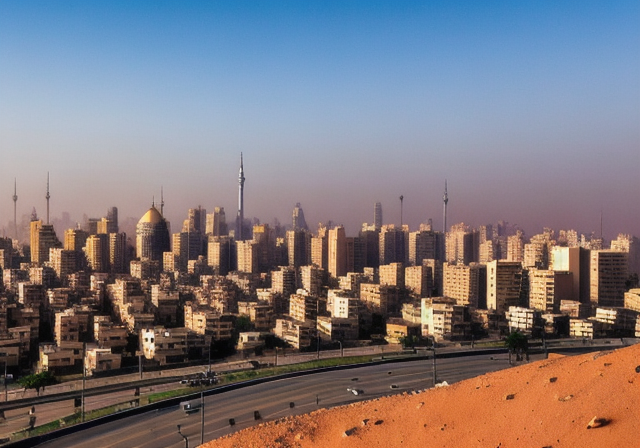History of Cairo
The city of Cairo, located on the banks of the Nile River, has a rich and fascinating history dating back to ancient times. Its origins can be traced back to the 10th century BC, when it became an important city in Egyptian civilization. During the Islamic era, Cairo became a cultural and religious center, with the construction of mosques, palaces, and universities. Ottoman rule brought significant changes to the city, while the colonial period witnessed European influence. Since independence, Cairo has undergone rapid modern development, becoming a vibrant and cosmopolitan metropolis.
**In the period of ancient origins**, Cairo was known as Memphis and served as the capital of the Ancient Egyptian Empire. The city was a political, religious, and economic center, with impressive monuments and temples. The Pyramids of Giza, including the Great Pyramid of Khufu, is one of the highlights of this period and remains one of Cairo's top tourist attractions.
**During the Islamic era**, Cairo flourished as an important center of the Islamic world. The city was founded in 969 AD by the Fatimid general Jawhar and became the capital of the Fatimid Caliphate. During this period, numerous mosques, palaces, and madrassas were built, including the famous Al-Azhar Mosque, one of the oldest universities in the world.
**Ottoman rule** began in the 16th century and brought with it a series of changes to Cairo. During this period, the city was expanded and fortified, with the construction of new walls and avenues. The Coptic Quarter, one of Cairo's oldest areas, witnessed the construction of Christian churches and monasteries.
**During the colonial period**, Cairo was occupied by the French in the late 18th century and then by the British in the 19th century. European influence brought a mix of architectural styles to the city, with neoclassical and art nouveau buildings. The Zamalek neighborhood, for example, is known for its mansions built during this era.
**After independence**, Cairo underwent rapid modern development. The city expanded geographically and became an important political, economic, and cultural center of Egypt. Major infrastructure projects were undertaken, such as the construction of the Cairo Metro and the expansion of residential neighborhoods. Today, Cairo is a bustling metropolis, with skyscrapers, shopping malls, museums, and a vibrant nightlife.

Cairo is also known for its historic neighborhoods, such as the Islamic Quarter, home to a number of well-preserved mosques and medieval structures. The Egyptian Museum, located in Tahrir Square, is a must-see for history buffs, housing a vast collection of Egyptian artifacts, including the treasures of Pharaoh Tutankhamun.
Interestingly, Cairo is also home to one of the oldest Christian communities in the world, the Copts. The Coptic Quarter is a sacred site for Egyptian Christians and is home to the Hanging Church, built on the ruins of the Babylon Fortress.
Exploring Cairo's history is a fascinating journey, allowing visitors to immerse themselves in ancient civilizations, admire stunning Islamic architecture, witness European colonial influence, and experience rapid modern development. The city offers a unique blend of past and present, allowing travelers to discover its rich cultural heritage while enjoying the amenities and facilities of a cosmopolitan metropolis.
Cairo tourist attractions
Cairo, the capital of Egypt, is a city full of history and culture, with a multitude of fascinating sights to explore. When visiting Cairo, travelers have the opportunity to discover some of the country's most iconic and important sites. Below, we highlight some of the must-see attractions in Cairo.
Pyramids of Giza
To the Pyramids of Giza are one of the wonders of the ancient world and one of Egypt's top tourist destinations. These massive stone structures, built over 4,500 years ago, are impressive testaments to the skill and ingenuity of the ancient Egyptians. The Great Pyramid of Khufu is the largest and most famous pyramid at Giza. Visitors can explore the inner chambers and learn about the history and the secrets of these monumental constructions.
Egyptian Museum
THE Egyptian Museum It's a treasure trove of historical artifacts and a must-see for history and culture lovers. Located in central Cairo, the museum houses a vast collection of Egyptian antiquities, including the famous death mask of Pharaoh Tutankhamun. Visitors can explore rooms filled with sarcophagi, statues, jewelry, and other ancient objects that tell the fascinating story of ancient Egypt.
Saladin Citadel
THE Saladin Citadel is a medieval fortress built in the 12th century by Sultan Saladin to protect the city from invasions. Located on a hill, it offers stunning views of Cairo. Inside the citadel, visitors can explore the Mosque of Muhammad Ali, known for its impressive architecture and for housing the tomb of the founder of modern Egypt. The citadel also houses museums, mosques, and picturesque gardens.
Khan el Khalili Market
THE Khan el Khalili Market is one of Cairo's oldest and most vibrant markets. It's a shopper's paradise, where you can find an impressive array of goods, from spices and jewelry to handicrafts and traditional clothing. Visitors can stroll through the market's narrow streets, bargain with vendors, and immerse themselves in the lively and exotic atmosphere of Old Cairo.
Alabaster Mosque
THE Alabaster Mosque, officially known as the Mosque of Muhammad Ali, is one of Cairo's most famous and impressive mosques. Located within the Saladin Citadel, the mosque is recognized for its elegant white alabaster minaret, visible from various points in the city. Its interior is equally impressive, with beautiful stained glass windows, ornate domes, and stunning architectural details.
Culture and traditions
Cairo's culture and traditions are rich and fascinating, reflecting the city's ancient history and the influence of Islam. Let's explore some important aspects of this vibrant culture.
Islamic art and architecture
THE Islamic art and architecture are essential elements of culture Cairo. The city is known for its magnificent mosques and palaces, which feature a unique blend of design and decoration. The buildings are characterized by ornate domes, elegant minarets, and intricate geometric patterns. An iconic example is the Alabaster Mosque, with its striking white dome and soaring minarets.
Islamic art also features prominently in paintings, calligraphy, and ceramics. Paintings often depict scenes from everyday life or natural elements, while Arabic calligraphy is appreciated as a form of artistic expression. Ceramics are decorated with elaborate patterns and vibrant colors, reflecting Cairo's rich artisanal tradition.
Folk music and dance
Folk music and dance are an integral part of Cairo's culture. Traditional Egyptian music is known for its moving melodies and captivating rhythms. Instruments such as the lute, qanun, and derbak are often used to create a unique atmosphere. During festivals and celebrations, it's common to see folk dance performances, such as belly dancing, which enchant spectators with their graceful movements and colorful costumes.
Egyptian gastronomy
Egyptian cuisine is a true journey of flavors. Typical Cairo dishes combine local ingredients, spices, and unique preparation techniques. One of the most famous dishes is Kushari, a mixture of noodles, lentils, rice, chickpeas, and tomato sauce. Another highlight is Molokhia, a green soup made with jute leaves and served with rice or bread. For sweet lovers, Basbousa, a semolina cake with sugar syrup, is a must-try delight.
Cairo's cuisine is also influenced by Arab and Mediterranean culture, with dishes like falafel, hummus, and kebab being popular. Local markets, such as the famous Khan el Khalili Market, are great places to sample and buy spices, teas, nuts, and traditional sweets.
Festivals and celebrations
Cairo is known for its lively festivities and colorful celebrations throughout the year. One of the most important festivals is Eid al-Fitr, which marks the end of Ramadan. During this time, families gather to share special meals and exchange gifts. Another significant festival is Moulid al-Nabi, which celebrates the birth of the Prophet Muhammad. During this celebration, the streets are filled with parades, music, and dancing.
Traditional clothing
Traditional Cairo dress reflects Islamic culture and values. Men typically wear the galabiya, a long, loose robe, accompanied by a kufi, a type of headdress. Women wear the hijab, a veil that covers the head and neck, and often wear an abaya, a long robe. The colors and styles of clothing vary, but respect for modesty is a common characteristic.

Fun Facts about Cairo
Cairo, Africa's largest city, is a fascinating metropolis steeped in history, culture, and tradition. Discover some interesting facts about this vibrant and chaotic city:
Chaotic traffic
Traffic in Cairo is known for being extremely chaotic. The streets are constantly congested with cars, motorcycles, and even horse-drawn carriages. The lack of adequate infrastructure and the large number of vehicles contribute to a heavy and challenging traffic situation. It's important to be patient and prepared to deal with this peculiar aspect of the city.
City of a thousand mosques
Cairo is known as the "City of a Thousand Mosques" due to the impressive number of Islamic places of worship scattered throughout the city. In addition to the famous Al-Azhar Mosque and the Mosque of Ibn Tulun, there are numerous other mosques with stunning architecture and rich history. Each mosque has unique characteristics and is a testament to the importance of Islam in Egyptian culture.
History of famous films
Cairo has an impressive history when it comes to famous films. The city has served as the backdrop for Hollywood productions such as "The Spy Who Loved Me" from the James Bond franchise and "The Mummy" with Brendan Fraser. Furthermore, renowned Egyptian director Youssef Chahine has gained international recognition for his acclaimed films, many of which were set in Cairo. The city offers a unique and inspiring atmosphere for the film industry.
House of Pharaoh Tutankhamun
Cairo is home to the famous Egyptian Museum, home to a priceless treasure trove of ancient artifacts, including the iconic treasure of Pharaoh Tutankhamun. The museum displays a vast collection of mummies, sarcophagi, statues, and historical objects dating back thousands of years. Visiting the Egyptian Museum is like traveling back in time and immersing yourself in ancient Egyptian civilization.
These are just some of the many curiosities that make Cairo a fascinating and unique city. From its chaotic traffic to its thousand mosques, Cairo is a destination that offers an enriching experience for travelers who wish to explore its rich history and culture.
Lucas Wanderlust has a tireless spirit of adventure, always seeking new travel experiences. Fascinated by the world and the possibility of exploring unknown destinations, he fell in love with the sense of freedom and self-discovery that traveling alone provides. With a backpack on his back and a heart open to the unknown, Lucas embarks on exciting journeys, where each destination becomes a unique chapter in his life story. He gives himself body and soul to the magic of solo travel, inspiring others to follow in his footsteps and discover themselves through adventure.







